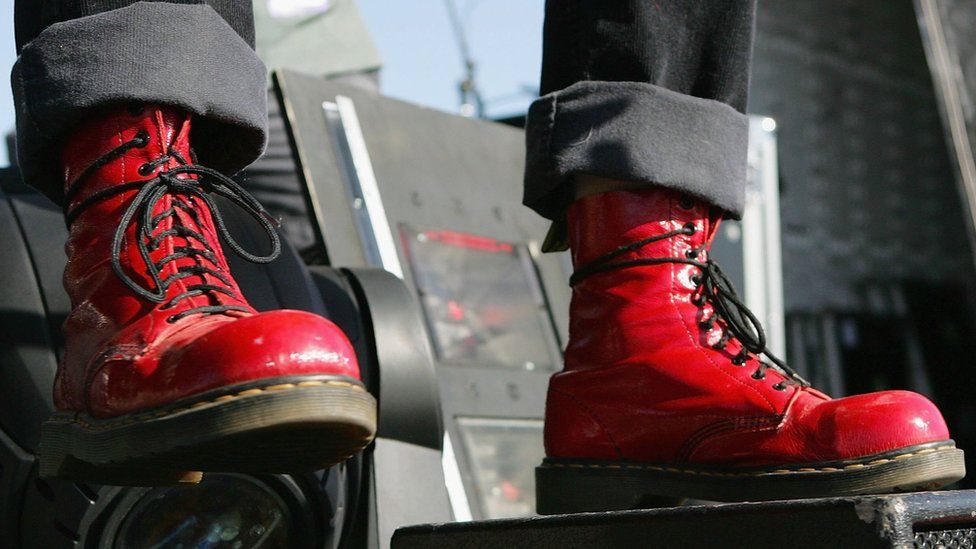Dr Martens shares plunge after profit warning
- Published
- comments

Dr Martens has warned its earnings will fall below expectations after the bootmaker's business was hit by warmer autumn weather and weak US sales.
The famous brand, which first became popular in the 1960s, said its trade in the US had become more challenging in recent months and that two of its major wholesalers had reduced orders.
Global profits for the firm fell by 55% to £25.8m in its half-year results.
The profit warning saw shares plunge by almost 25% early on Thursday.
Chief executive Kenny Wilson said trading in the second half of the year had been "mixed", with sales across the world impacted by warmer weather at the start of autumn.
"In the USA, where there is an increasingly difficult consumer environment, our results have been more challenged, led by weakness in wholesale," he added.
The company said in its results that widespread caution among Dr Martens wholesale customers had resulted in a "weaker order book than in prior years", but added that trade in recent weeks in Europe, the Middle East and Asia-Pacific had improved.
Driven by poor trade across the Atlantic, the firm said it expected its full-year revenues to decline by a "high single-digit percentage".
In its latest results, the company revealed US earnings were 31% lower in the six months to 30 September, compared with the same period last year.
Dr Martens makes more than half of its revenues from its most recognisable products, the eight-holed 1460 boot and sister product the 1461 shoe.
But it has struggled with weakening demand in the US for some time, especially as the cost of living has increased around the world, with less cash for discretionary spending.
In 2021, Dr Martens raised the prices of its footwear by £10 due to rising production and material costs, taking the price of its classic 1460 boots in the UK to £159 a pair. It has continued to rise and currently costs £169, according to the retailer's website.
"When times are good, Dr Martens has shown it is possible to make decent returns from its iconic products," said Russ Mould, investment director at AJ Bell.
"But when the economic outlook is more uncertain, the company suffers from having its products priced slightly above the level at which someone wouldn't think too hard about paying."
Liza Amlani, principal of consultancy firm Retail Strategy Group and professor at the Fashion Institute of Technology in New York, told the BBC while the brand boasted some bestsellers, it now had "too many styles".
"Today their website boasts 592 styles for women's footwear, 382 styles for men's footwear, and 192 styles. It's excessive," she said.
"Each style includes an array of colours and sizes, resulting in an unclear merchandising strategy that risks overwhelming and confusing customers."
She said Dr Martens should "rethink" its approach to merchandising, reduce the styles it offers, and "focus on finding the right influencer strategy that is relevant to the US market".
The Dr Martens brand was founded in 1960 in Northampton. Its air-cushioned sole was developed by Munich-based Dr Maertens and Dr Funck and the UK patent rights were sold to R Griggs Group.
The footwear that emerged from the collaboration was initially sold as a work boot, but was taken up by the early skinhead youth movement of the 1960s. The boots also become popular with punks in the 1970s and had a resurgence when Britpop emerged in the 1990s.
Today the boots, also known as Docs or DMs, remain popular.
When Dr Martens listed on the London Stock Exchange in 2021 its shares were priced at 370p. On Thursday its shares were trading at around 86p.
"There always seems to be a stone in the shoe for Dr Martens ever since its IPO in 2021," said Susannah Streeter, head of money and markets at Hargreaves Lansdown.
"Earlier this year the company was beset by operational problems at its Los Angeles distribution centre. Once again, hopes of a rebound in sales have been booted away and long-term growth for the brand looks highly uncertain."
Mr Wilson said the company continued to "have faith in our iconic brand, and we continue to believe in the long-term growth potential of the business".